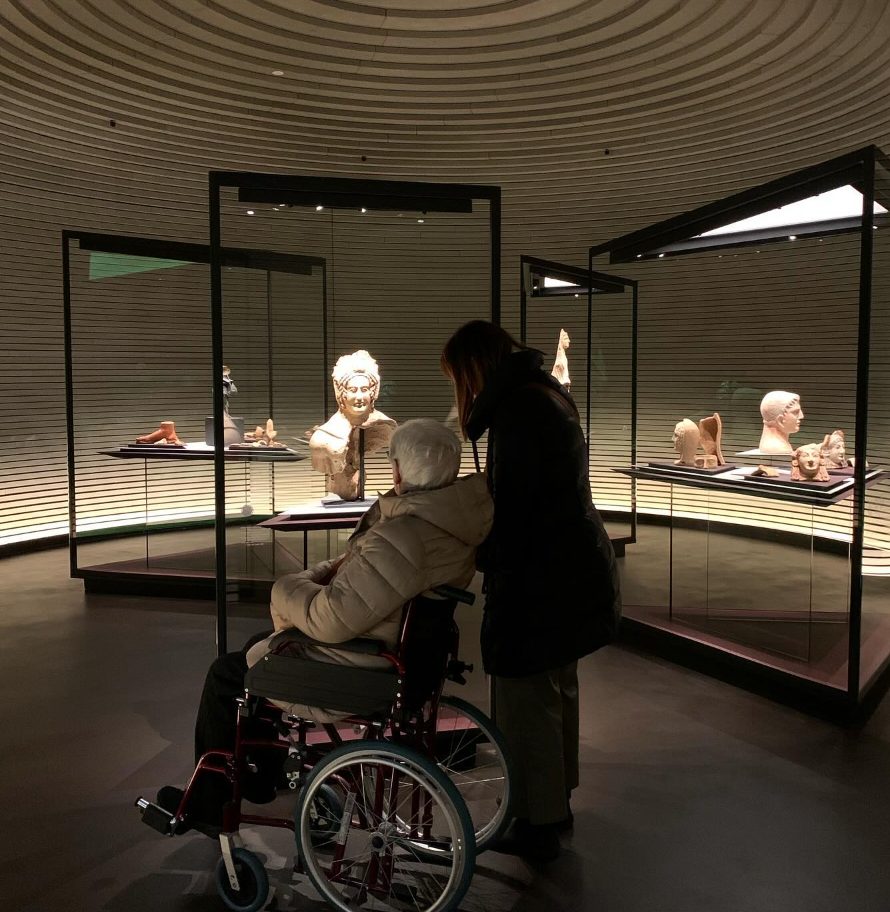They visit exhibitions and museums, act, write poetry, paint. They are people with Alzheimer’s or other forms of cognitive impairment who live in “Il Paese Ritrovato” in Monza, the first village in Italy for people with dementia. Their memory does not retain traces of these experiences, but contact with beauty generates well-being, it remains in the state of mind and this makes a difference in the quality of life. Art and culture in this citadel managed by social cooperative La Meridiana they are part of a new treatment modality and go hand in hand with medicine and technology to try to counteract the progressive decline of skills and relationships. Here even the colors of the rooms and buildings are designed in this way, to make beauty an implicit cure.
Paola Perfetti, drama therapist, deals with the emotional-relational activities that guests freely choose. «With the beauty of art we touch the sensitive imaginary side and activate a communication that goes beyond words, often compromised due to dementia. Art facilitates contact, beauty is not only aesthetic but also moral: it affects memory and feelings”, she explains.
Poetry and theatre
The encounter with poetry takes place with a laboratory that produces sharing. The verses flow freely, often linked to love and friendship. «It is a sort of playful manifesto that accompanies a reflection on life. After this activity they are more smiling, they look for each other: the well-being is prolonged.” In 2023 the guests published a collection of their compositions, entitled The maximum of the minimum: they are verses that “demolish” the clichés and stigma of the disease. A second collection is coming soon. «The non-pharmacological model is effective», he highlights Mariella Zanetti, geriatrician at Meridiana, «able to reduce mood disorders and discomfort and promote the cognitive stability of the resident. At the center is the person, with all their peculiarities.”
The non-pharmacological model is effective, capable of reducing mood disorders and promoting the resident’s cognitive stability. At the center is the person, with his or her peculiarities
Mariella Zanetti, geriatrician of the La Meridiana social cooperative
Guests on stage at “Il Paese Rediscovered”
A healthcare and therapeutic innovation in the management of mild and moderate dementia, where theater is also part of everyday life. Here the technique used is that of guided improvisation on stage. Perfetti suggests the joke: the guests are not satisfied with repeating it and add something of their own, almost always with logic. Perfetti’s direction, which always intervenes in concert with the medical team, also allows us to manage some character disorders due to the pathology: «Problems become strengths. Even those who have significant cognitive impairment wear a white mask and let themselves go. Through acting, people feel effective: they communicate the message that they work. Applause is an important form of gratification that identifies them with reality. Here and now is the only way they recognize.”
Thanks to a project supported by a donor, the guests are working on a comedy that will also have a public impact in 2024. The performance will be recorded. Seeing each other on stage is therapeutic, for residents but also for caregivers and relatives. «Art is a vehicle of care because it reaches people’s hearts first», concludes Perfetti.
Even those who have significant cognitive impairment wear a white mask and let themselves go. Through acting, people feel effective: they communicate the message that they work
Paola Perfetti, drama therapist
Let’s go to the museum
The latest innovation in this direction is the collaboration of La Meridiana with the Luigi Rovati Foundation for the “Stare Bene Insieme” project. The objective is to redefine the concept of museum access for people with dementia: the project in fact proposes a museum visit itinerary designed for people with dementia and their carers. The research phase is currently underway and will last until March 2024.
People with mild and moderate dementia and their caregivers will visit the museum of Luigi Rovati Foundation in Milan following six distinct visit itineraries, developed with different levels of difficulty. With an app and a tablet they will explore the works on display also through tailor-made video guides, then preparing for subsequent visits. The collection of questionnaires and the analysis of the response of the various groups of visitors will allow the Foundation to introduce adaptations to set up inclusive itineraries in the museum. «This project is an invitation to look beyond the diagnosis and to valorise everyone’s stories», underlines the Meridiana educator, Marco Fumagalli. «We must increasingly spread the idea of a fulfilling existence even for people who are losing their memory and self-awareness. Aesthetic experiences, without forcing but where there is interest and predisposition, must be cultivated because they generate well-being.”
Photos from the social cooperative La Meridiana and from the Instagram page of the Luigi Rovati Foundation
